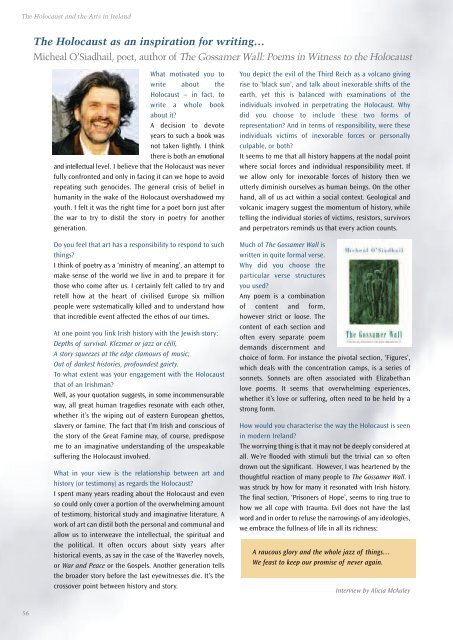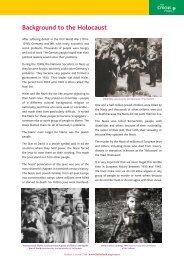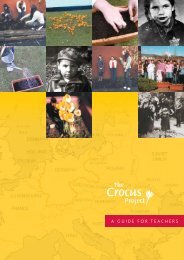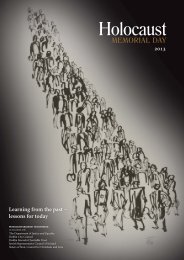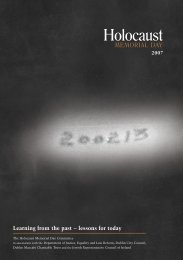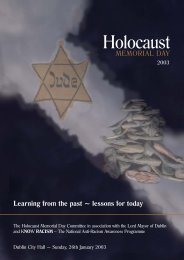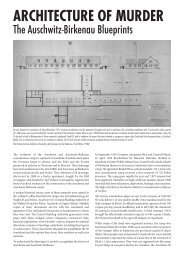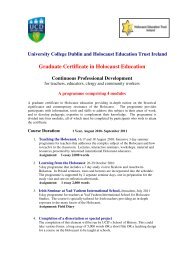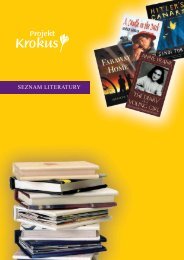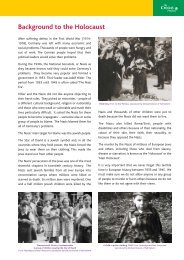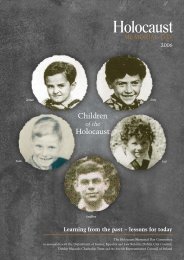Learning from the past ~ lessons for today - Holocaust Education ...
Learning from the past ~ lessons for today - Holocaust Education ...
Learning from the past ~ lessons for today - Holocaust Education ...
Create successful ePaper yourself
Turn your PDF publications into a flip-book with our unique Google optimized e-Paper software.
The <strong>Holocaust</strong> and <strong>the</strong> Arts in Ireland<br />
The <strong>Holocaust</strong> as an inspiration <strong>for</strong> writing…<br />
Micheal O’Siadhail, poet, author of The Gossamer Wall: Poems in Witness to <strong>the</strong> <strong>Holocaust</strong><br />
What motivated you to<br />
write about <strong>the</strong><br />
<strong>Holocaust</strong> – in fact, to<br />
write a whole book<br />
about it?<br />
A decision to devote<br />
years to such a book was<br />
not taken lightly. I think<br />
<strong>the</strong>re is both an emotional<br />
and intellectual level. I believe that <strong>the</strong> <strong>Holocaust</strong> was never<br />
fully confronted and only in facing it can we hope to avoid<br />
repeating such genocides. The general crisis of belief in<br />
humanity in <strong>the</strong> wake of <strong>the</strong> <strong>Holocaust</strong> overshadowed my<br />
youth. I felt it was <strong>the</strong> right time <strong>for</strong> a poet born just after<br />
<strong>the</strong> war to try to distil <strong>the</strong> story in poetry <strong>for</strong> ano<strong>the</strong>r<br />
generation.<br />
Do you feel that art has a responsibility to respond to such<br />
things?<br />
I think of poetry as a ‘ministry of meaning’, an attempt to<br />
make sense of <strong>the</strong> world we live in and to prepare it <strong>for</strong><br />
those who come after us. I certainly felt called to try and<br />
retell how at <strong>the</strong> heart of civilised Europe six million<br />
people were systematically killed and to understand how<br />
that incredible event affected <strong>the</strong> ethos of our times.<br />
At one point you link Irish history with <strong>the</strong> Jewish story:<br />
Depths of survival. Klezmer or jazz or céilí,<br />
A story squeezes at <strong>the</strong> edge clamours of music;<br />
Out of darkest histories, profoundest gaiety.<br />
To what extent was your engagement with <strong>the</strong> <strong>Holocaust</strong><br />
that of an Irishman?<br />
Well, as your quotation suggests, in some incommensurable<br />
way, all great human tragedies resonate with each o<strong>the</strong>r,<br />
whe<strong>the</strong>r it’s <strong>the</strong> wiping out of eastern European ghettos,<br />
slavery or famine. The fact that I’m Irish and conscious of<br />
<strong>the</strong> story of <strong>the</strong> Great Famine may, of course, predispose<br />
me to an imaginative understanding of <strong>the</strong> unspeakable<br />
suffering <strong>the</strong> <strong>Holocaust</strong> involved.<br />
What in your view is <strong>the</strong> relationship between art and<br />
history (or testimony) as regards <strong>the</strong> <strong>Holocaust</strong>?<br />
I spent many years reading about <strong>the</strong> <strong>Holocaust</strong> and even<br />
so could only cover a portion of <strong>the</strong> overwhelming amount<br />
of testimony, historical study and imaginative literature. A<br />
work of art can distil both <strong>the</strong> personal and communal and<br />
allow us to interweave <strong>the</strong> intellectual, <strong>the</strong> spiritual and<br />
<strong>the</strong> political. It often occurs about sixty years after<br />
historical events, as say in <strong>the</strong> case of <strong>the</strong> Waverley novels,<br />
or War and Peace or <strong>the</strong> Gospels. Ano<strong>the</strong>r generation tells<br />
<strong>the</strong> broader story be<strong>for</strong>e <strong>the</strong> last eyewitnesses die. It’s <strong>the</strong><br />
crossover point between history and story.<br />
You depict <strong>the</strong> evil of <strong>the</strong> Third Reich as a volcano giving<br />
rise to ‘black sun’, and talk about inexorable shifts of <strong>the</strong><br />
earth, yet this is balanced with examinations of <strong>the</strong><br />
individuals involved in perpetrating <strong>the</strong> <strong>Holocaust</strong>. Why<br />
did you choose to include <strong>the</strong>se two <strong>for</strong>ms of<br />
representation? And in terms of responsibility, were <strong>the</strong>se<br />
individuals victims of inexorable <strong>for</strong>ces or personally<br />
culpable, or both?<br />
It seems to me that all history happens at <strong>the</strong> nodal point<br />
where social <strong>for</strong>ces and individual responsibility meet. If<br />
we allow only <strong>for</strong> inexorable <strong>for</strong>ces of history <strong>the</strong>n we<br />
utterly diminish ourselves as human beings. On <strong>the</strong> o<strong>the</strong>r<br />
hand, all of us act within a social context. Geological and<br />
volcanic imagery suggest <strong>the</strong> momentum of history, while<br />
telling <strong>the</strong> individual stories of victims, resistors, survivors<br />
and perpetrators reminds us that every action counts.<br />
Much of The Gossamer Wall is<br />
written in quite <strong>for</strong>mal verse.<br />
Why did you choose <strong>the</strong><br />
particular verse structures<br />
you used?<br />
Any poem is a combination<br />
of content and <strong>for</strong>m,<br />
however strict or loose. The<br />
content of each section and<br />
often every separate poem<br />
demands discernment and<br />
choice of <strong>for</strong>m. For instance <strong>the</strong> pivotal section, ‘Figures’,<br />
which deals with <strong>the</strong> concentration camps, is a series of<br />
sonnets. Sonnets are often associated with Elizabethan<br />
love poems. It seems that overwhelming experiences,<br />
whe<strong>the</strong>r it’s love or suffering, often need to be held by a<br />
strong <strong>for</strong>m.<br />
How would you characterise <strong>the</strong> way <strong>the</strong> <strong>Holocaust</strong> is seen<br />
in modern Ireland?<br />
The worrying thing is that it may not be deeply considered at<br />
all. We’re flooded with stimuli but <strong>the</strong> trivial can so often<br />
drown out <strong>the</strong> significant. However, I was heartened by <strong>the</strong><br />
thoughtful reaction of many people to The Gossamer Wall. I<br />
was struck by how <strong>for</strong> many it resonated with Irish history.<br />
The final section, ‘Prisoners of Hope’, seems to ring true to<br />
how we all cope with trauma. Evil does not have <strong>the</strong> last<br />
word and in order to refuse <strong>the</strong> narrowings of any ideologies,<br />
we embrace <strong>the</strong> fullness of life in all its richness:<br />
A raucous glory and <strong>the</strong> whole jazz of things…<br />
We feast to keep our promise of never again.<br />
Interview by Alicia McAuley<br />
56


